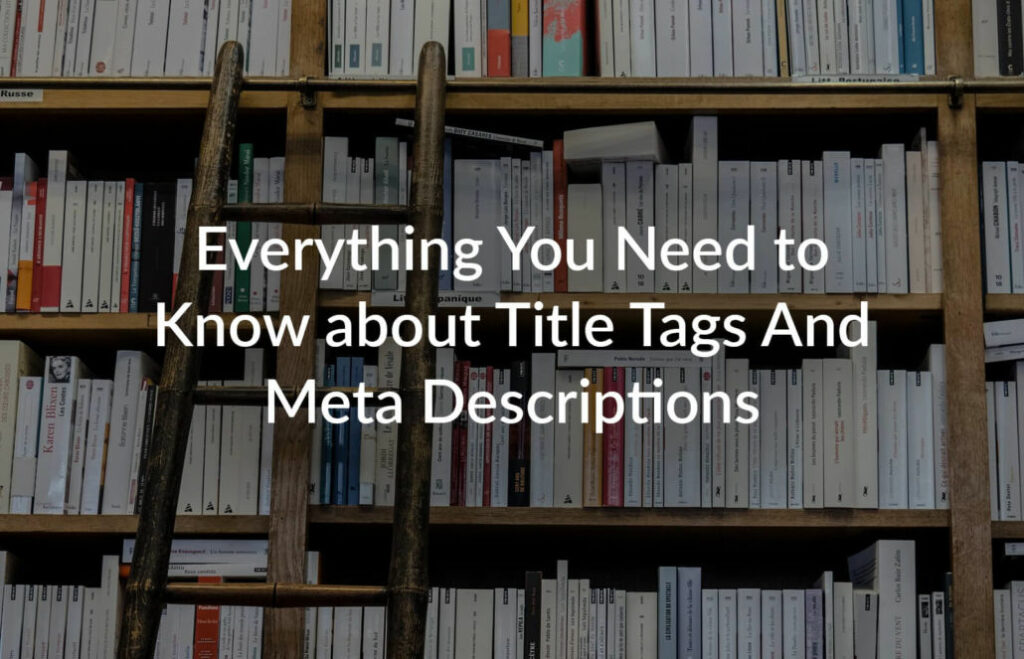It’s not uncommon to hear beginners to SEO inquiring about the essence of title tags and Meta descriptions.
While we could dive straight into explaining just how important they are in modern SEO practices, a little definition of terms is necessary.
When users search for content on the web, title tags and Meta descriptions are what usually load up on the search engine results. To gain more clicks, it’s is therefore imperative that you invest some time to develop compelling meta tags that prompt more users to check out your website once the search results roll in.
Title Tag
This is the title section of a webpage which briefly summarises what’s contained in a page. They are usually found in three main places, on search engine results, browsers and on external platforms like social media pages.
To rank, search engines require websites to have title tags to include relevant keywords and phrases that accurately describe what’s contained in the page. As such, if you find yourself straying away from the agenda of your page, you may be forcing Google’s hand to display some other title instead.
Since this is not something you want to happen, it’s best to really craft meaningful title tags. There’s plenty of opportunities for you to lure prospects to click through your site by having a relevant title tag. A great way to capture some of this information is by providing accurate, concise, and compelling narratives of your page.
Here’s an example of how the HTML code looks like:
Some Tips on How to Write Compelling Title Tags
- Ensure that the title you develop is highly relevant to the content you share on a particular page
- Insert essential keywords and phrases near the beginning of the title tag so that you inspire users to click through
- Be sure to write naturally for visitors and try not to stuff in keywords hap hazardously
- Don’t duplicate the content on your page. Because all the pages on your website are going to have different topics, you need to ensure that you come up with unique titles
- If possible, include your brand name towards the end of the title tag. That said, you need to put more emphasis on getting the message right first.
- Try to keep the length between 60-64 characters. Sticking by this rule ensures that all the content fits comfortably in a 512-pixel display. If you write something longer, the title will appear lengthy and ellipsis may be introduced
- Strive to come up with eye-catching tiles. With the objective being to lure visitors to click on the title tag to discover what you’re all about, you need to have your A-game on at all times
Meta Descriptions
Meta descriptions are meant to convey a summary of all the content contained on a webpage. As you can already tell, it has some similarity to the previously mentioned title tag. The key difference here is that Meta descriptions allow you some ample breathing space.
You have the freedom to flex your wordplay with plenty more space as you let visitors to your site know what you’re offering. If well utilised, you can grab hold of a significant portion of the population.
Here’s how Meta descriptions usually look like:
<head>
<meta name=”description” content=” This is where you insert your Meta description. Write something interesting.”>
</head>
Tips on Writing Meta Descriptions
- Make sure all the descriptions on your page are unique
- Come up with compelling descriptions without forgetting to incorporate relevant keywords. As a rule of thumb, strive to cover what users can expect to find once they are on the actual webpage
- Try to inspire curiosity in readers. While the objective is to inform them on what your webpage contains, don’t give up all the information too soon. Failure to abide by this rule may see you registering lower click-through numbers since users will already know all they can expect to find on your page.
- Don’t forget to incorporate a call to action somewhere in the Meta description. Doing this informs readers how they can benefit from reading the content
- The ideal size of a Meta description is 150-154 characters. You should avoid using lengthy meta descriptions since search engines typically cut off any extra characters found.
Meta Data Optimisation

A great way to do this is by monitoring the click-through rates in Google Search Console. Using the tool, you can locate pages with reasonable volume but low click-through rates. To practice, you can try optimising the pages as per the highlighted steps above.
If you really want to push your website as the best out there, don’t make the mistake of neglecting Metadata. The best way to keep abreast with the times is by constantly monitoring the happenings of this section.
Having said that, we caution you against making too many changes in a short span of time. This is because it usually takes some time before adjustments made come into effect and cause an impact. In light of this, you need to hold out for a while in order to track what’s actually working
Importantly, you also need to consider the average time visitors spend on your site. While CTR is a great metric to monitor, it’s not the be-all and end-all of success.
If a significant portion of visitors is spending fewer amounts of time on your page, that could be an indicator that your metadata is not appealing enough or your webpage isn’t living up to the standards people expect. When this happens, it may indicate that your website is built on the foundations of clickbait, something you want to avoid.
Rocket Your Rankings with a Solid SEO Strategy
- ClickSlice is a London SEO agency, who specialise in boosting the search engine rankings of company websites. We take an individualistic approach to SEO and work with businesses to develop a plan that works best for their specific situation. For more information on how we transform businesses through the power of organic internet traffic, contact ClickSlice today on 020 3287 3638 or email us at hello@clickslice.co.uk.










